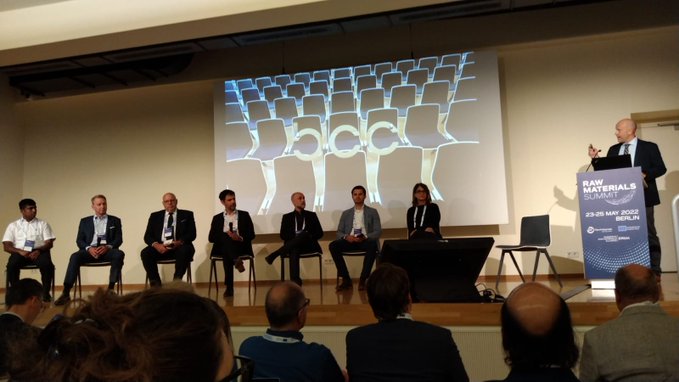Prof. Alberto Bollero presents the PASSENGER project during the Raw Materials Summit in Berlin
30.05.2022
 |
|
Alberto Bollero during the debate at the Raw Materials Summit in Berlin. |
Madrid, May 30th, 2022. Businessmen, researchers and policy makers defended On 25th May in Berlin the reduction of European dependence on raw materials from third countries. Participants in the Raw Materials Summit, organized by EIT RawMaterials, addressed the state of the art in a forum where the main technological innovations and policy initiatives focused on deepening the independence of European economies from foreign materials were presented.
Prof. Alberto Bollero, leader the Group of Permanent Magnets and Applications at IMDEA Nanociencia and coordinator of PASSENGER project, presented the ambition of PASSENGER during the debate “Critical but not rare: Building European rare earth and permanent magnets value chain”. Prof. Bollero led the session and debated together with other key figures from academia and industry. Prof. Bollero's participation was in the context of one of the new research lines "Nanotechnology for Critical Raw Materials and Sustainability" of the 4-year Severo Ochoa Excellence project, awarded to IMDEA Nanoscience in 2017 and recently renewed for 4 years.
The objectives of the Green Deal of the European Union force to bet on renewable energies and electromobility, but the production of batteries and motors that make possible the operation of these devices requires minerals such as lithium, nickel, copper, iron or rare earths, which mostly must be imported from other regions to fill European shortages.
Prof. Alberto Bollero, researcher at IMDEA Nanociencia Institute and speaker at the Summit, explained that the war in Ukraine forces the European Union to accelerate its objectives and change its strategy to deal with possible shortage problems. The full interview can be read in EFE: https://www.efe.com/efe/espana/economia/europa-apuesta-por-la-independencia-en-materias-primas-contra-escasez/10003-4814086
About PASSENGER
The multidisciplinary PASSENGER consortium (coordinated by IMDEA Nanociencia) consists of 20 partners including key end users and SMEs/LEs (14 companies) from 8 EU countries: Spain, Austria, Italy, Slovenia, Germany, France, Greece and United Kingdom. It involves major European industries, academic leaders and associations occupied with permanent magnets manufacturing, alloy production, powder fabrication, electric motors, e-vehicles, eco-design and product/process standardisation. Thus, PASSENGER covers the whole magnets production value chain, from studying fundamental properties to the production of high-technology end products, while aiming at making the transition from a linear to a circular model involving citizens, international platforms and relevant stakeholders. PASSENGER project has received funding from the EU research and innovation programme Horizon 2020 under grant agreement no. 101003914.
More information:
https://www.efe.com/efe/espana/economia/europa-apuesta-por-la-independencia-en-materias-primas-contra-escasez/10003-4814086
About PASSENGER project https://passenger-project.eu/
Contact:
Prof. Alberto Bollero
alberto.bollero [at]imdea.org
https://nanociencia.imdea.org/home-en/people/item/alberto-bollero-real
Twitter: @PerMagIMDEA
Oficina de Comunicación de IMDEA Nanociencia
divulgacion.nanociencia [at]imdea.org
Twitter: @imdea_nano
Facebook: @imdeananociencia
Instagram: @imdeananociencia
Source: IMDEA Nanociencia





